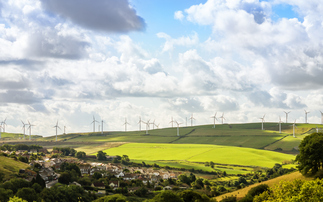There are powerful reasons why the UK should host the COP26 Climate Summit in 2020, and they are worthy of consideration
Don't. Don't sing it. Resist the temptation. Please don't adapt the lyrics to declare that the COP Summit is 'coming home'.
After England's semi-final exit at this summer's World Cup the Croatians let it be known they had indeed been irked by the presumptive cockiness implicit in that supposedly light-hearted anthem. Our European neighbours have more than enough Brexit-related reasons to want to deny the UK a major diplomatic coup and let the country host one of the most important international summit's in history. We don't want to give them another one.
However, there are very good reasons for selecting the UK to host COP26 in 2020 following confirmation from Energy and Clean Growth Minister Claire Perry that an official bid has been lodged. And those reasons do relate, at least in part, to the idea that global efforts to tackle climate change would be coming home.
It was, after all, the UK that was the crucible of the Industrial Revolution. Thanks to accidents of geography and culture the UK was the first coal-powered, truly global economic superpower. It was the imperial force that extracted the resources and exported the technologies that ensured high carbon development went global. It was the technology hub that blazed the trail for the two centuries of fossil fuelled development that followed. If climate change is a crisis of existential proportions the UK is at the very heart of its origin story.
But at the same time it was the UK that provided the scientific institutions that first detected that fossil fuelled growth might prove to be problematic. It was a British Prime Minister (and scientist) in Margaret Thatcher who first attempted to put the issue on the international agenda. And since 1990 it is the UK that has cut greenhouse gas emissions further and faster than any other major economy, becoming a globally-recognised clean tech and green finance hub in the process. This summer the country went full circle generating no power from coal for a full 24 hours for the first time since the Industrial Revolution.
COP26 will be a truly critical meeting: the point at which the Paris Agreement comes into full effect; the point at which those nations committed to climate action come forward with bolder decarbonisation plans; and the point at which we find out whether the Trump Presidency is a one-term, climate sceptic, Paris Agreement-quitting anomaly or an electorally successful template for pollutocrats everywhere to follow. The symbolic power of the Summit being hosted by a country that has demonstrated that both sustained decarbonisation and a cross party consensus on climate action are not just possible, but highly desirable, is not to be underestimated.
At a more pragmatic level, a 2020 Summit in the UK has plenty to recommend it. From Gordon Brown's emergency conference in the midst of the financial crash to the 2012 London Olympics, the UK has a track record of delivering the fine point logistics needed to ensure successful international mega-events. The capital boasts the largest concentration of green NGOs and think tanks in the world, as well as one of the planet's top green finance and media environments. The UK sits in a timezone that makes those last ditch calls to Asia and the US easier to co-ordinate. From electric bus fleets to offshore wind farms there are countless photo opportunity-ready clean tech projects to provide a backdrop. There are plenty of good hotels, top embassies, and award-winning restaurants. It may sound mundane and officials rarely get to leave the confines of the Summit venue, but as the success of the Paris Summit demonstrated, high spec organisation and positive mood music really matters.
The arguments against awarding the Summit to the UK are two-fold. The first is that Westminster's climate policy efforts are simply too inconsistent for it to have the credibility to host such a high profile event - an argument embodied today by the Extinction Rebellion's latest protests at Perry's support for fracking. It is a completely understandable critique and it gains ever more credibility each time the government approves a runway or throws tax breaks at oil and gas or low-balls support for renewables projects.
But equally if UN Climate Summit's were only awarded to countries with a fully coherent decarbonisation strategy they would simply never happen. Delivering a net zero emission economy is a multi-decadal battle characterised by trade-offs and setbacks and numerous dramas. The UK's strategy is a long way from perfect, but if you look at the raw metrics for clean energy and emissions reduction it is firmly in the global Premier League. It has the world's largest offshore wind industry, one of the most advanced green finance sectors, a growing electric vehicle manufacturing base, a world-leading green services industry, top universities and R&D facilities, and, following today's announcement, plans for the world's first net zero emission industrial cluster.
Moreover, awarding the 2020 Summit to the UK would almost certainly help to drive renewed progress as the government considers the wave of policies needed to accelerate decarbonisation throughout the 2020s. For example, it is hard to see how a Prime Minister could stand up at a Summit on British soil in 2020 and demand other nations do more to tackle climate change if they had not already passed legislation setting a net zero emission target for the UK and firming up the final phase out date for coal power as a bare minimum.
The second argument against a COP26 Summit in London, Birmingham or Edinburgh is that we currently lack the diplomatic A-game necessary to deliver the historic breakthrough that will be required. After yet another week that has seen the government nearly collapse and the entire Brexit project teeter on the brink under the weight of its own contradictions it is hard not to nod along in agreement.
Italy is said to want the honour of hosting COP26. Will other EU member states really dismiss Rome's claims in favour of a bid from a country that has spent most of the past two years being, erm, more than a little, shall we say, antagonistic?
And yet, even here you can make a compelling case for letting the UK have its moment in the sun. After all the warm words - from both sides - about the UK and the EU remaining friends and allies on the big picture issues that really matter, after all the assurances that the UK will not backslide on climate action post-Brexit, what better way is there to put those sentiments into action?
British diplomacy may have taken a fearful battering over the past three years, but up until very recently it was regarded as supremely, subtly effective by global superpowers and smaller nations alike. The muscle memory that once saw the UK punch above its weight at the UN and beyond is still there. The ties with the Commonwealth countries that will be so critical to securing a deal, the relationships in Washington and Beijing, the shared interests with Brussels, the soft power of media influence and royal glamour, they all still exist. With committed leadership, strong business backing and public engagement, and a project of the upmost importance to focus on the UK's diplomatic nous can be revived in time for 2020.
Finally, let's be honest: we kind of need this. After two years dominated by Brexit to the exclusion of all other issues, the need for a unifying national project that can bring together political parties, big business, civil society, and the wider public in pursuit of a better, cleaner, healthier economy is paramount. COP26 would not deliver that in and of itself, but it could be the rallying point. It could be the historic starting pistol for the UK and the rest of the world, igniting a decade in which clean technologies and green business models flow out from these shores until they span continents, transforming the global economy in the process, just as their polluting forbears did two centuries ago.
Whisper it, don't sing it, but could it be coming home?
This article first appeared on BusinessGreen's Overnight Breifing email update, which is available to all BusinessGreen subscribers











